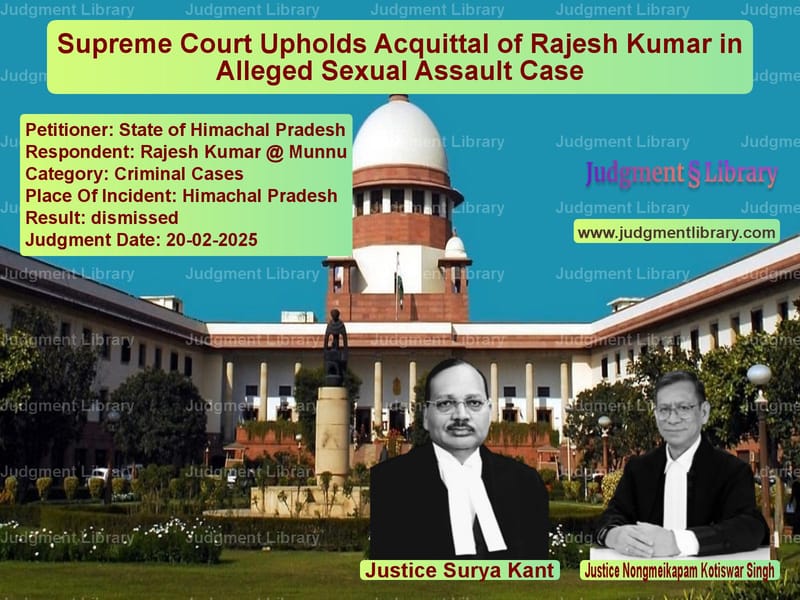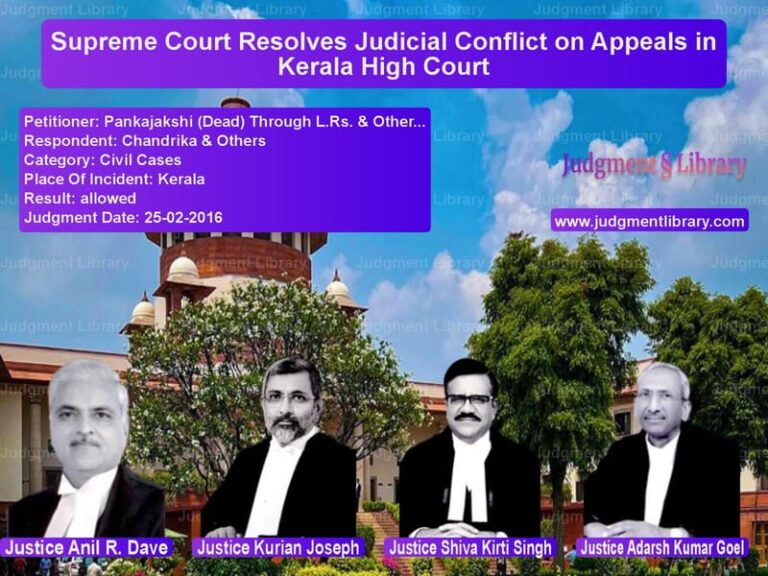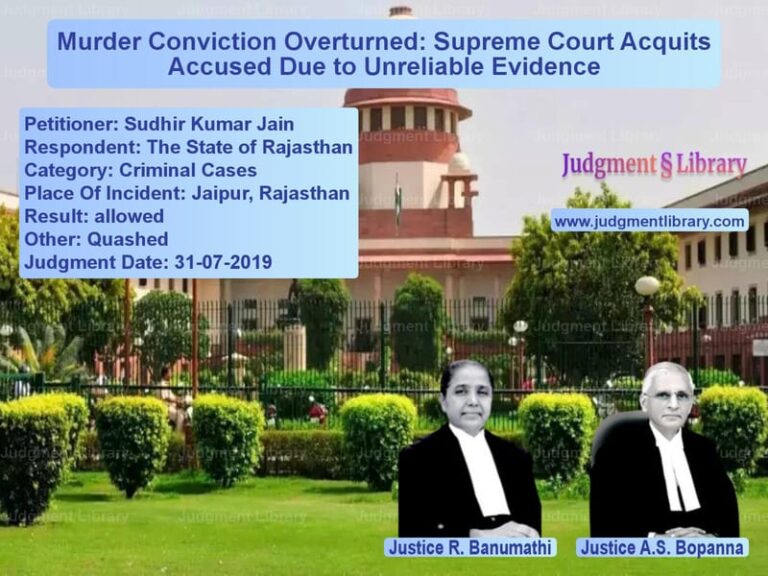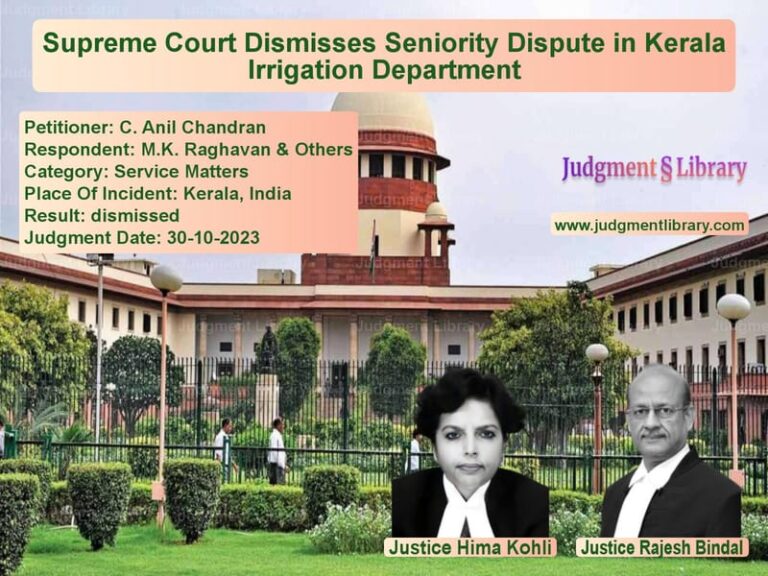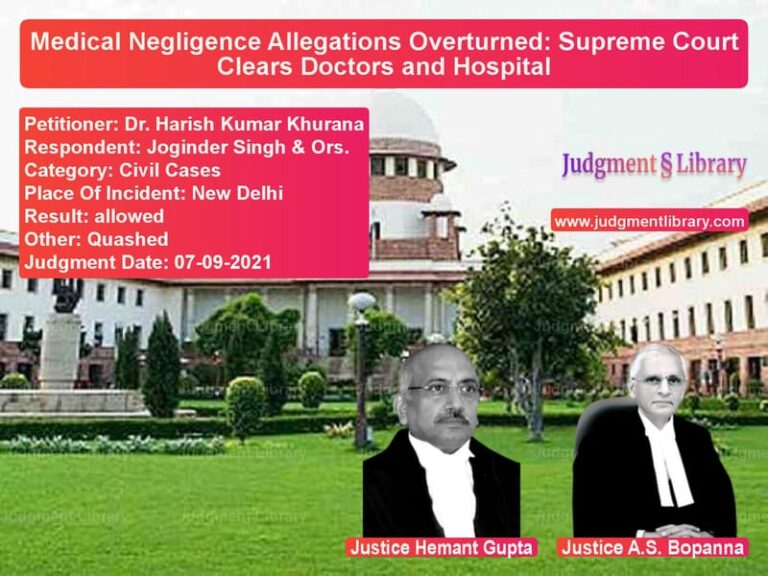Supreme Court Upholds Acquittal of Rajesh Kumar in Alleged Sexual Assault Case
The Supreme Court of India, in its judgment dated February 20, 2025, dismissed the State of Himachal Pradesh’s appeal against the acquittal of Rajesh Kumar @ Munnu in a case involving allegations under Sections 376 and 452 of the Indian Penal Code (IPC). The Court upheld the Himachal Pradesh High Court’s ruling, which had overturned the trial court’s conviction and found significant discrepancies in the prosecution’s case.
Background of the Case
The case against Rajesh Kumar originated from an FIR lodged on August 13, 2007, by the father of the prosecutrix. The complaint alleged that while the prosecutrix was alone at home, the accused entered the house under the pretext of asking for a matchbox and then forcibly raped her. The prosecutrix narrated the incident to her parents upon their return, leading to the registration of the case under Sections 376 (rape) and 452 (house trespass after preparation for hurt, assault, or wrongful restraint) IPC.
The trial court, after examining 14 prosecution witnesses and the statement of the accused under Section 313 of the Code of Criminal Procedure (Cr.P.C.), convicted Rajesh Kumar and sentenced him to 10 years of rigorous imprisonment along with fines.
High Court’s Decision
Rajesh Kumar appealed against his conviction before the Himachal Pradesh High Court, which allowed the appeal and acquitted him. The High Court’s decision was based on various inconsistencies and shortcomings in the prosecution’s case:
- The mother of the prosecutrix (PW-9) turned hostile and denied that any such incident occurred.
- The father of the prosecutrix (PW-8) also provided evasive statements and failed to explain the delay in lodging the FIR.
- The medical examination of the prosecutrix by Dr. Sunita Galodha (PW-7) found no evidence of sexual assault.
- The forensic report did not confirm the presence of semen on the prosecutrix’s clothes or vaginal swab.
- The prosecutrix herself did not cooperate with the medical examination, refusing even a basic physical check-up.
In light of these inconsistencies, the High Court concluded that the prosecution had failed to establish its case beyond a reasonable doubt and granted Rajesh Kumar the benefit of the doubt.
Petitioner’s Arguments (State of Himachal Pradesh)
The State of Himachal Pradesh, in its appeal before the Supreme Court, argued:
- The trial court had correctly convicted the accused based on the testimony of the prosecutrix.
- The High Court failed to appreciate the trauma and hesitancy of a victim in narrating the details of a sexual assault.
- The delay in filing the FIR should not be considered fatal to the case, given the social stigma attached to such incidents.
- The prosecutrix’s reluctance during medical examination was a result of her mental distress.
Respondent’s Arguments (Rajesh Kumar)
Rajesh Kumar, represented by his counsel, countered the prosecution’s claims, arguing:
- The case was falsely lodged due to personal enmity.
- The mother of the prosecutrix, who would have been a natural witness, denied that the incident occurred.
- The medical examination provided no corroborative evidence of sexual assault.
- The forensic evidence did not support the prosecution’s version.
- The delay in lodging the FIR raised serious doubts about the credibility of the allegations.
Supreme Court’s Observations
The Supreme Court extensively analyzed the evidence and upheld the High Court’s ruling. The Court emphasized the well-established principle that an accused is entitled to the benefit of the doubt in cases where the prosecution fails to establish its case conclusively.
The Court noted:
“The High Court has succinctly demonstrated some of the glaring lacunae in the prosecution case, which even the learned State counsel before us is unable to satisfactorily justify.”
Regarding the medical and forensic evidence, the Supreme Court referred to the findings of Dr. Sunita Galodha:
“The prosecutrix was found to be of normal gait, had no marks of injury on any part of her body, and did not allow even a tip of a little finger to be inserted inside her vagina. There was no blood or semen found on her private parts or vaginal swab.”
The Court also considered the prosecutrix’s refusal to undergo a full medical examination at RPMC Hospital, Dharamshala:
“Non-allowance of medical examination by an alleged rape victim raises negative inferences against them.”
On the issue of delay in filing the FIR, the Court observed:
“The father of the prosecutrix failed to explain the delay in reporting the matter. Delay in lodging an FIR in such cases must at least be acknowledged and explained by the prosecution.”
Final Judgment
The Supreme Court concluded that the High Court had meticulously examined the evidence before granting Rajesh Kumar the benefit of the doubt. The Court reaffirmed the principle that unless an acquittal is based on a complete misreading of the evidence or is perverse, it should not be interfered with.
“The High Court has microscopically examined the entire evidence before firmly opining that the present accused-respondent deserves the benefit of the doubt.”
Accordingly, the appeal was dismissed, and Rajesh Kumar’s acquittal was upheld.
Implications of the Judgment
This judgment highlights several key legal principles:
- Burden of Proof in Criminal Cases: The prosecution must establish guilt beyond a reasonable doubt.
- Role of Medical and Forensic Evidence: Absence of physical evidence weakens the prosecution’s case in sexual assault allegations.
- Delay in Filing FIR: Courts continue to scrutinize unexplained delays in lodging complaints, especially in criminal cases.
- Hostile Witnesses: When key prosecution witnesses turn hostile, it significantly impacts the credibility of the case.
Conclusion
The Supreme Court’s ruling in State of Himachal Pradesh vs. Rajesh Kumar underscores the importance of strong, corroborative evidence in criminal cases, particularly in allegations of sexual offenses. While the judiciary remains sensitive to victims of sexual violence, it also ensures that the rights of the accused are protected through due process. The case reinforces the legal doctrine that conviction cannot be sustained on mere allegations without reliable supporting evidence.
Petitioner Name: State of Himachal Pradesh.Respondent Name: Rajesh Kumar @ Munnu.Judgment By: Justice Surya Kant, Justice Nongmeikapam Kotiswar Singh.Place Of Incident: Himachal Pradesh.Judgment Date: 20-02-2025.
Don’t miss out on the full details! Download the complete judgment in PDF format below and gain valuable insights instantly!
Download Judgment: state-of-himachal-pr-vs-rajesh-kumar-@-munnu-supreme-court-of-india-judgment-dated-20-02-2025.pdf
Directly Download Judgment: Directly download this Judgment
See all petitions in Bail and Anticipatory Bail
See all petitions in Custodial Deaths and Police Misconduct
See all petitions in Fraud and Forgery
See all petitions in Judgment by Surya Kant
See all petitions in Judgment by N. Kotiswar Singh
See all petitions in dismissed
See all petitions in supreme court of India judgments February 2025
See all petitions in 2025 judgments
See all posts in Criminal Cases Category
See all allowed petitions in Criminal Cases Category
See all Dismissed petitions in Criminal Cases Category
See all partially allowed petitions in Criminal Cases Category

